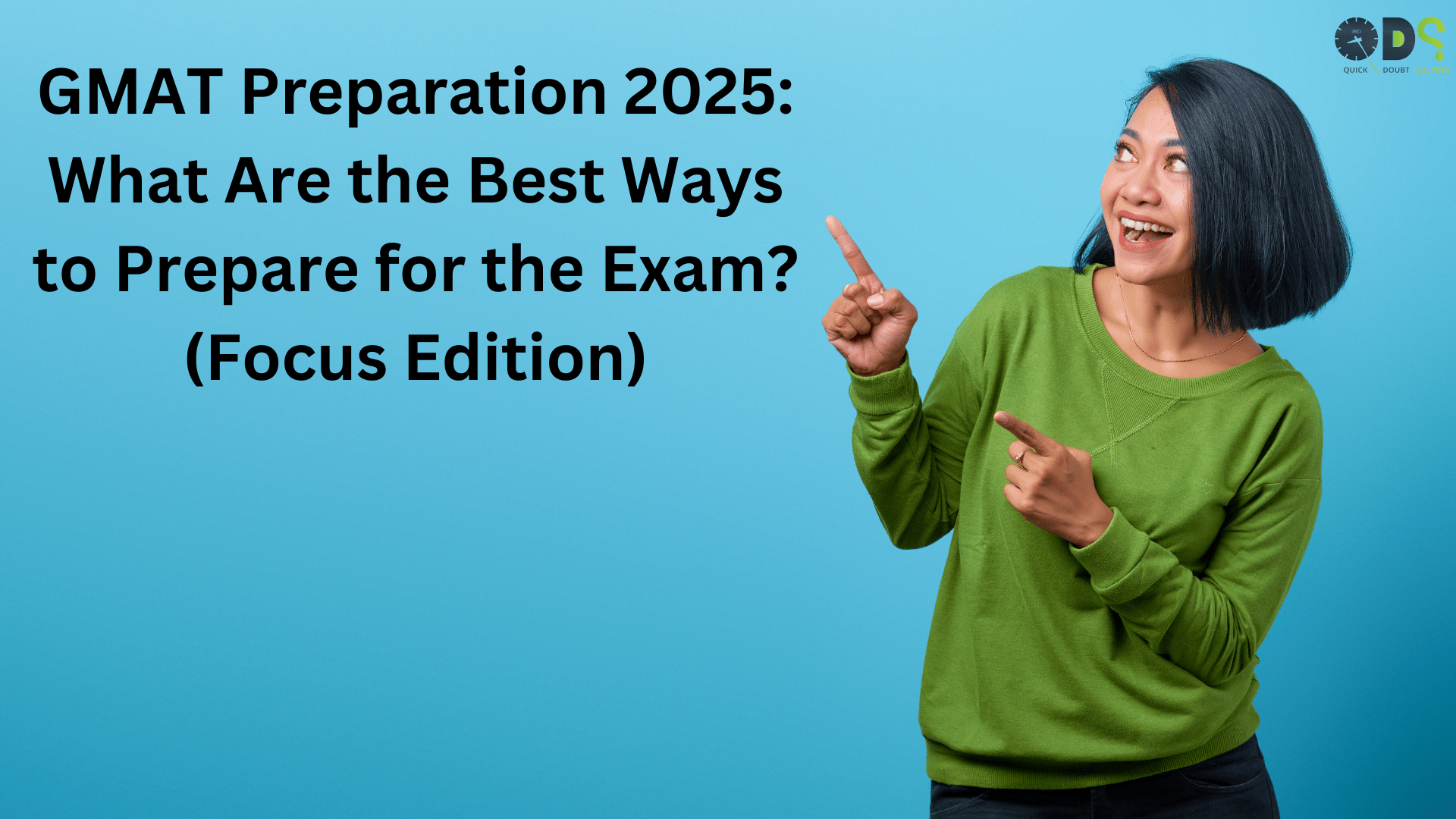The GMAT Focus Edition, introduced in 2023, represents a significant shift in the way the Graduate Management Admission Test (GMAT) is structured. As we move into 2025, it’s crucial to adapt your GMAT preparation strategy to the updated format. This new version of the exam places more emphasis on data interpretation, problem-solving, and decision-making, making it essential for aspirants to adjust their study methods accordingly. Institutes like QDS Pro have been at the forefront of providing tailored GMAT preparation programs, helping students succeed in this evolving landscape.
In this article, we’ll explore the best ways to prepare for the GMAT Focus Edition, incorporating personal experiences, success stories, and a step-by-step guide to effective GMAT preparation.

1. Understand the GMAT Focus Edition Format for Effective GMAT Preparation
The most important change in the GMAT preparation Focus Edition is the streamlined format. The exam now consists of three main sections:
- Quantitative Reasoning (QR): This section tests your ability to solve quantitative problems, focusing on problem-solving and data sufficiency. Unlike the previous format, the QR section in the Focus Edition has a heavier emphasis on data analysis and decision-making.
- Verbal Reasoning (VR): This section evaluates your reading comprehension, sentence correction, and critical reasoning abilities. The GMAT preparation Focus Edition now places a stronger emphasis on analyzing written material and drawing conclusions based on context.
- Data Insights (DI): The new section replaces the Integrated Reasoning (IR) section and tests your ability to interpret and analyze data from various sources, including tables, graphs, and charts. This is an essential skill for business school applicants, as it reflects real-world decision-making.
Personal Experience: As a GMAT preparation aspirant myself, understanding the new Focus Edition format was critical to my preparation. By focusing more on data analysis and decision-making, I was able to better tailor my study materials to align with the new exam structure.
2. Creating a Targeted Study Plan for GMAT Preparation Success
GMAT preparation requires a well-structured study plan, especially for the Focus Edition. Here’s how to break down your preparation:
- Weeks 1-2: Familiarize yourself with the exam format and the key areas of focus, particularly in the QR and DI sections. Begin by reviewing the basics of math and verbal reasoning.
- Weeks 3-4: Focus on the Data Insights section. Work on practice questions that involve analyzing and interpreting data from different formats. This is where many students tend to struggle, so dedicating time here is essential.
- Weeks 5-6: Begin taking full-length practice tests under timed conditions to simulate the real test experience. This will help you gauge your progress and identify areas where you need more practice.
- Weeks 7-8: Focus on refining your strategies for tackling complex problems in QR and VR. At this stage, focus on your weak areas, whether it’s sentence correction or data interpretation.
Success Story: One of our successful students, Aditi, used this targeted approach to her GMAT preparation. She focused heavily on data analysis and decision-making early in her GMAT preparation and saw remarkable improvements in her scores. Her ability to analyze data from charts and tables was key to her success.
3. Use Official and Updated GMAT Preparation Materials
For GMAT preparation, it’s essential to use the most current and accurate prep materials. Here are some resources that align with the Focus Edition format:
- GMAT Official Guide (Focus Edition): This guide includes real questions from previous exams and is updated to reflect the changes in the Focus Edition.
- GMAT Focus Edition Practice Tests: Practice tests are an essential tool in GMAT preparation. These tests simulate the exam experience and help you identify areas where you need improvement.
- GMAT Focus Edition Online Courses: Institutes like QDS Pro offer live online tutoring that focuses on the new exam format, with instructors providing tailored lessons for each section of the test.
Personal Experience: I found that using the updated practice tests helped me familiarize myself with the Focus Edition format. This gave me a significant advantage in understanding the types of questions and the time constraints of the exam.
4. Focus on Your Weak Areas in GMAT Preparation
While preparing for the GMAT Focus Edition, it’s important to focus on your weak areas. For example, if you find the Data Insights section challenging, dedicate extra time to practice questions involving tables, charts, and graphs. Similarly, if verbal reasoning is your weak spot, practice reading comprehension and sentence correction regularly.
Strategy for Addressing Weak Areas:
- Identify Weaknesses Early: Start by identifying which sections or question types give you the most trouble.
- Practice Consistently: Focus on improving those areas through targeted practice. For instance, if you struggle with verbal reasoning, practice sentence correction questions every day.
- Track Progress: Keep track of your improvement by reviewing your practice test results. Look for patterns in your mistakes to help you fine-tune your approach.
Success Story: Raj, a student of QDS Pro, initially struggled with the Data Insights section. However, by focusing on targeted practice using official GMAT preparation materials, he was able to improve his score significantly. His dedication to mastering data analysis through practice questions was instrumental in his success.
5. Taking Full-Length Practice Tests for Effective GMAT Preparation
One of the most effective ways to prepare for the GMAT Focus Edition is to take full-length practice tests under timed conditions. This helps you become familiar with the test’s pacing and build endurance. It also allows you to identify patterns in your mistakes and adjust your study plan accordingly.
Strategy for Full-Length Practice Tests:
- Simulate Test Conditions: Try to take your practice tests in a quiet environment and adhere to the timing limits.
- Review Mistakes: After each practice test, spend time reviewing your mistakes. Identify whether you missed questions due to time pressure, misunderstanding, or lack of knowledge.
- Refine Strategy: Based on your review, refine your test-taking strategies for the actual exam.
Personal Experience: I personally found that taking full-length practice tests helped me improve my time management skills. I was able to refine my pacing and develop strategies for handling difficult questions without getting stuck.
6. Utilize Data-Driven Insights for GMAT Preparation Success
With the GMAT Focus Edition’s emphasis on data interpretation and analysis, using data-driven insights from your practice tests can be a game-changer. Review your performance after each test to identify which areas need improvement. Focus on refining your strategies based on this feedback.
Strategy for Using Data Insights:
- Analyze Your Performance: After each practice test, review not only your mistakes but also your performance in each section.
- Target Weak Areas: If you notice a pattern of weaknesses in a particular section, devote extra study time to that area.
- Track Improvement Over Time: Keep track of your scores over time to see how you are improving. This can provide motivation and help you stay focused.
Success Story: Priya, a QDS Pro student, used the data from her practice tests to refine her approach to the Data Insights section. By analyzing her weaknesses and adjusting her strategies, she saw a significant improvement in her score.
7. Staying Consistent and Maintaining a Positive Mindset for GMAT Preparation
GMAT preparation is a marathon, not a sprint. Staying consistent and maintaining a positive mindset throughout your preparation is crucial. Break down your study sessions into manageable chunks, take regular breaks, and celebrate small victories along the way.
Strategy for Consistency and Mindset:
- Set Achievable Goals: Break your GMAT preparation into smaller, manageable goals. For example, aim to complete a certain number of practice questions each day or improve your score on practice tests week by week.
- Stay Positive: Keep a positive attitude even when you face setbacks. Remember, improvement takes time, and persistence pays off.
- Take Care of Yourself: Don’t neglect your physical and mental well-being. Exercise, eat well, and get enough sleep to ensure you’re in peak condition for your study sessions.
Personal Experience: I found that staying positive and not getting discouraged by setbacks helped me stay on track. The journey can be tough, but staying motivated and focused on your goals is key to success.
Conclusion: GMAT Preparation 2025 and Beyond
In 2025, preparing for the GMAT Focus Edition requires a thoughtful approach, focused on mastering the new format, understanding key sections like Data Insights, and refining your problem-solving and analytical skills. By following a structured study plan, using high-quality resources, and focusing on your weak areas, you can significantly improve your chances of success. For those seeking expert guidance, QDS Pro offers personalized coaching that can help you achieve your desired GMAT score with targeted lessons and practice.
With the right GMAT preparation, a strategic mindset, and a commitment to consistent practice, you’ll be well on your way to achieving your target GMAT score and securing a place in your desired business school.
Pro Tip: If you’re looking for expert guidance and personalized support in your GMAT preparation, enrolling in live online coaching from QDS Pro can provide you with the structure and support you need to excel in the GMAT Focus Edition.
FAQs: GMAT Preparation Focus Edition
Q1: How long should I spend on GMAT preparation for the Focus Edition?
The duration of your GMAT preparation depends on your starting point and target score. Most students spend between 2 to 3 months preparing for the exam. Focus on creating a study plan that allows you to gradually build up your skills and knowledge.
Q2: What is the best strategy for GMAT preparation?
The best strategy for GMAT preparation involves understanding the exam format, creating a targeted study plan, focusing on your weak areas, and taking full-length practice tests. It’s essential to familiarize yourself with the new GMAT Focus Edition format, particularly the Data Insights section, and practice regularly with official materials. Institutes like QDS Pro offer live online tutoring, which can provide personalized guidance and support.
Q3: How can I improve my Data Insights section for GMAT preparation?
To improve your performance in the Data Insights section of the GMAT Focus Edition, practice interpreting data from tables, charts, and graphs. Use GMAT preparation materials that focus on this area, and work on time management to ensure you can analyze data quickly and accurately. If you’re struggling, consider enrolling in live online tutoring sessions at QDS Pro, where instructors can provide targeted strategies for mastering this section.
Q4: Can I prepare for the GMAT Focus Edition on my own?
Yes, self-study is a viable option for GMAT preparation, but it requires discipline and access to the right materials. Make sure to use the GMAT Focus Edition Official Guide and other updated practice resources. While self-study can be effective, many students benefit from the structure and personalized support provided by coaching institutes like QDS Pro, which offers expert guidance and live online tutoring for a more focused approach.
Q5: How do I manage time during GMAT preparation?
Time management is a crucial aspect of GMAT preparation. Make sure to simulate real test conditions by taking timed practice tests regularly. Divide your study time between different sections, focusing on the areas that need improvement. During your study sessions, avoid distractions and focus solely on the task at hand. If you’re struggling with time management, QDS Pro offers expert coaching that can help you develop efficient test-taking strategies.



